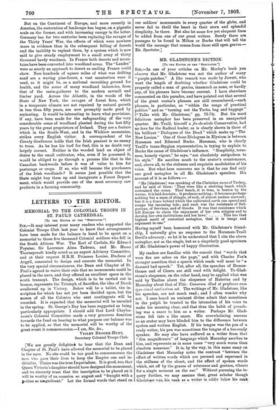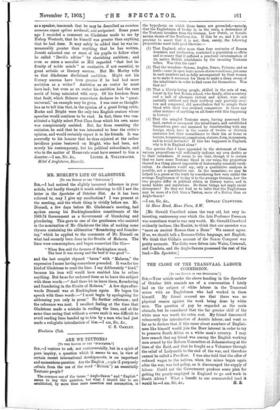MR. GLADSTONE'S DICTION.
[To THE EDITOR OP THE 'SPECTATOR."]
Sur,—In one of your articles on Mr. Morley's book you. observethat Mr. Gladstone was not the author of many "purple patches." A like remark was made by Jowett, who went the length of doubting whether Gladstone could be properly called a man of genius, inasmuch as none, or hardly. any, of his phrases have become current. I have elsewhere commented on this paradox, and have pointed out that several
of the great orator's phrases are still remembered,—such phrases, in particular, as "within the range of practical
politics" and as "turning out the Turks, bag and baggage" (" Talks with Mr. Gladstone," pp. 73-74). But his most felicitous metaphor has been preserved in an unexpected quarter. Mr. Traill, himself a fin-de-siècle Conservative, had no love for the Radical leader, as is clearly shown in three of his brilliant "Dialogues of the Dead" which make up "The
New Lucian." One of those Dialogues in Elysium is between Horsman and Edmund Burke. Horsman, who is clearly Train's trans-Stygian representative, is trying to explain to Burke the cause of Gladstone's influence. " Simplicity, terse- ness, homely vigour," he says, "are absolutely antipodean to his style." He ascribes much to the orator's countenance, and, above all, to the richness and exquisite modulation of his voice. But what here concerns me is that he can find only one good metaphor in all Mr. Gladstone's speeches. His account of it is as follows r-
" He [Gladstone] was speaking of the Christian races of Turkey, and he said of them : They were like a shelving beach which restrained the ocean. That beach, it is true, is beaten by the waves; it is laid desolate ; it produces nothing; it becomes perhaps - nothing but a mass of shingle, of rock, of almost useless seaweed ; but it is a fence behind which the cultivated earth can spread and escape the incoming tide; and such was the resistance of Bul- garians, of Servians, and of Greeks. It was that resistance which left Europe to claim the enjoyment of her own religion and to develop her own institutions and her laws.' . . . . . This has that highest merit of oratorical metaphor, that it is image and argument in one."
Having myself been honoured with Mr. Gladstone's friend- ship, I naturally give no response to the Horsman-Traill Devil's advocacy; so let it be understood that I cite the above metaphor, not as the single, but as a singularly good specimen of Mr. Gladstone's power of happy illustration.
My readers are familiar with the conceit that "words that were fire are ashes on the page," and with Charles Fox's stronger assertion that a speech which reads well must be "a,
damned bad speech." Yet, after all, the speeches of Demos- thenes and of Cicero are still read with delight. To Glad- stone's eloquence, on the other hand, may be applied what was said by Tacitus about the eloquence of Haterius and by Macaulay about that of Pitt : Canorum illud et profiuens cum ipso simu2 exstinctum est. The writings of Mr. Gladstone, like his speeches, are not much read ; and I often wonder why
not. I once heard an eminent divine admit that sometimes in the pulpit he trusted to the intonation of his voice to make his meaning clear, and that thus the habit of preach- ing was a snare to him as a writer. Perhaps Mr. Glad- stone fell into a like snare. His overwhelming success as an orator may have blinded him to the difference between spoken and written English. If his tongue was the pen of a ready writer, his pen was sometimes the tongue of a too-ready speaker. He may also have suffered as a writer from that "dim magnificence" of language which Macaulay ascribes to him, and represents as in some cases "very much worse than absolute nonsense." It is, by the way, in this same essay on Gladstone that Macaulay notes the contrast "between the effect of written words which are perused and reperused in the stillness of the closet, and the effect of spoken words which, set off by the graces of utterance and gesture, vibrate for a single moment on the ear." Without pursuing the in; quiry further, we may assume that, great scholar though Gladstone was his rank as a writer is oddly below his rank
as a speaker, insomuch that he may be described as cnnnium consensu caps= °Tame scribendi, nisi scripsisset. Some years ago I recorded a comment on Gladstone made to me by Bishop Westhott, that he himself was greater than anything that he had done. It may safely be added that he was im- measurably greater than anything that he has written. Jowett exhorted one or more of his pupils to follow what he called "Devil's advice" by cherishing ambition ; and even so stern a moralist as Mill regarded "that last in- firmity of noble minds" as conducive, if not essential, to great artistic or literary success. But Mr. Morley tells na that Gladstone disclaimed ambition. Might not his literary success have been greater if he had had more ambition as a writer? Ambition as an orator he must have had; but even as an orator his ambition had the rare merit of being untainted with envy. Of his freedom from that fault, which Scherer somewhere declares to be "quasi- universal," an example may be given. I was once so thought- less as to tell him that, in the opinion of a great living critic, Burke and Bright were the only two English orators whose speeches would continue to be read. In fact, these two con- stituted a highly select First Class from which his own name was conspicuously omitted. But, far from resenting the omission, he said that he was interested to hear the critic's opinion, and would certainly report it to his friends. It was assuredly to his honour that he thus rejoiced at the rather invidious praise bestowed on Bright, who had been, not merely his contemporary, but his political subordinate, and who in the matter of Home-rule must have seemed to him a































































 Previous page
Previous page